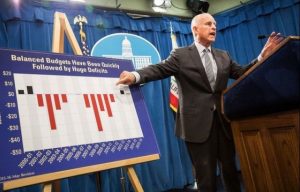Brown Signs New $122-Billion Budget
Sacramento, CA — With little fanfare, Governor Jerry Brown put his signature on a new $122.5-Billion budget yesterday.
The Governor touts that it pays down debt, puts more money into the rainy day fund, boosts funding for education, and creates new programs to combat homelessness. The Governor signed the budget, “as-is” and made no executive vetoes. The last time a Governor declined to make a single veto was the 1982-83 budget when Governor Brown was also at the helm.
The Governor’s Office has released the below information about what Brown feels are the budget highlights:
Boosting Reserves, Paying Down Debt
In addition to the constitutionally-required $1.3 billion deposit, the budget directs an extra $2 billion contribution into the Rainy Day Fund – bringing the state’s reserve fund to $6.7 billion, or 54 percent of the goal. The budget also directs $1.75 billion to the Special Fund for Economic Uncertainties, which also helps the state meet obligations in the face of declining revenue or unanticipated obligations, and pays down debts and liabilities by $1.3 billion from Proposition 2 funds.
Investing in Education
The minimum funding guarantee for K-12 schools and community colleges will grow to $71.9 billion this year, the highest level in state history and a $24.6 billion increase since 2011-12. Per-pupil K-12 funding is increased to $10,643, a $440 increase over last year and a $3,600 increase over 2011-12 levels. This reinvestment continues to help correct historical inequities in school district funding with $2.9 billion in new funding for the Local Control Funding Formula – bringing the formula’s implementation to 96 percent complete.
The budget keeps University of California and California State University tuition at 2011-12 levels while providing significant, new one-time and ongoing funding increases.
Counteracting Poverty
This year’s budget begins implementing the state’s new $15 per hour minimum wage by raising the statewide minimum wage to $10.50 per hour beginning on January 1, 2017. The budget also funds cost-of-living increases for Supplemental Security Income/State Supplementary Payment, the first boost since 2005.
The budget also repeals of the “maximum family grant rule” in CalWORKs, which had denied support to children born to parents who were receiving aid. It also limits the state’s asset recovery from the estates of deceased Medi-Cal recipients.
Reducing Housing Costs
The budget reflects $3.6 billion in state and federal funding and award authority for many affordable housing and homelessness programs, including increased funding for CalWORKs rapid rehousing and emergency homeless shelters.
Of this amount, the budget sets aside $400 million in the General Fund for allocation later in the legislative session for affordable housing programs. The funding will be coupled with the Administration’s proposed legislation requiring ministerial “by right” land use entitlements for multifamily infill housing developments that include affordable housing. This would help constrain development costs, improve the pace of housing production and encourage an increase in housing supply. In addition, legislation will authorize a $2 billion bond from a portion of future Proposition 63 mental health revenues to develop and administer homelessness and affordable housing programs for the mentally ill.
Strengthening Infrastructure
The budget includes $2 billion for state infrastructure improvements and maintenance, including $1.3 billion General Fund for state buildings, $270 million in lease-revenue bond authority for local jails and $688 million ($485 million from the General Fund) for critical deferred maintenance at levees, state parks, universities and community colleges, prisons, state hospitals and other state facilities.

